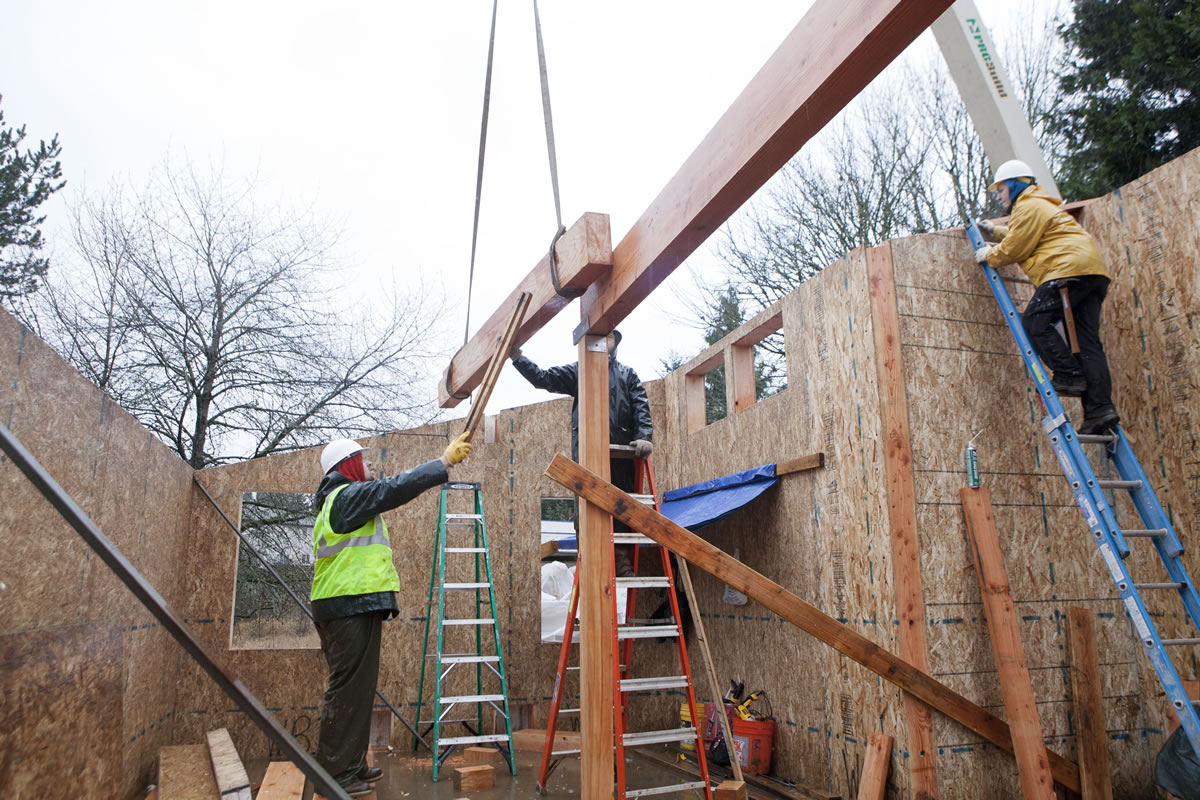After years of running into life’s walls, Dennis and Sheri Ziesemer recently saw their fortunes turn.
Now they’re helping build walls.
The two Camas-area residents have spent much of this year volunteering with Evergreen Habitat for Humanity, working their way toward a new home of their own. The end result will offer at least some relief to a couple that’s endured more than its share of struggle.
The Ziesemers navigated the Habitat application process in 2011 with reserved expectations. Life seemed to deliver them one setback after another, from major medical problems to financial difficulties. Recent history didn’t suggest much reason for optimism.
But by fall 2011, they found out they were qualified and approved.
“It was kind of jaw-dropping,” Sheri said. “You’re hitting brick walls left and
right, and then all of a sudden … that brick wall is one you can climb over? Really?
“I almost didn’t believe it.”
Their soon-to-be new home isn’t your typical Habitat project. The Ziesemers will move into the Planet Clark Emerald House, a partnership with Clark County designed to showcase a series of environmentally friendly features.
The $129,000 project, located just off Northeast 99th Street, will use 60 percent less energy than a typical home, according to the county. It will use 60 percent less water and collect all of its own storm runoff through native vegetation on the property. Natural sunlight and specially insulated wall and roof panels will help keep the house warm in the winter.
The project aims to provide a real-life example of green building that local developers can learn from, said Mike Selig of the county’s Community Development department. Other local builders have tackled projects with similar goals in mind. That’s because seeing something in person gives more insight than any meeting or conference could, Selig said.
“At the end of the day, we’ll have a very tangible asset that will last for a very long time,” Selig said.
For now, the home remains a work in progress. Earlier this month, Dennis Ziesemer joined a group of volunteers in setting roof beams above the wall panels already in place. Later, a crane hoisted sections of the roof itself onto the structure.
The men worked in a cold, steady rain. But Dennis, who’s made his career in drafting and building design, looked like there was nowhere he’d rather be.
His wife Sheri looked on from the driveway. She leaned on a cane, huddled under an umbrella.
“If I were able,” Sheri said, “I would be in there, too.”
Sheri was diagnosed with multiple sclerosis five years ago, but suspects she’s battled the disease much longer than that. The condition commonly known as MS affects her balance, her movement, even standing at times, she said. Constant cold and uneven floors in the Ziesemers’ poorly insulated home now make basic functions even more of a struggle, Sheri said.
Two years ago, the family received another dose of bad news: Dennis was diagnosed with colon cancer. After months of treatment and chemotherapy, the cancer is now in remission. But not before it changed the family dynamic.
“It kind of turned the tables a little, and I became his caregiver,” Sheri said.
And now?
“Now we just kind of take care of each other,” she said.
Dennis and Sheri both receive disability assistance. Sheri can’t work. Dennis runs his own design business, but jobs are hit and miss. They live in an old home outside Camas, with two of their adult children.
The 1,154-square-foot Emerald House will be a bit of a downsize from their current home. But both Dennis and Sheri said they’re delighted to make the move, particularly after plans were tweaked to meet their needs, Dennis said. They’ve volunteered with Habitat — Sheri doing office work — to earn their “sweat equity” as part of the program’s requirements.
The Ziesemers may be able to move into their new home in the spring. With their past and present health needs, neither knows what the future holds. They’ve leaned on faith and hope to get through tough times, Sheri said, and that won’t change.
“You never want to give up hope,” Sheri said. “What do you have when you’ve given up hope? You’re lost.”
Eric Florip: 360-735-4541; http://twitter.com/col_enviro; eric.florip@columbian.com.




